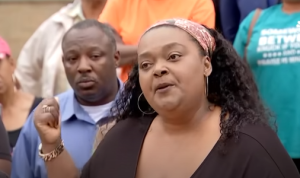A group of Chicago residents has filed a lawsuit against the city, expressing their concerns and frustrations over the city’s decision to house migrants in public buildings, including schools and parks. The lawsuit, which was announced during a press conference, represents a significant pushback from communities that feel their needs have been neglected in favor of accommodating new arrivals. The residents argue that this policy exacerbates existing inequalities and disregards the long-standing issues faced by marginalized communities in Chicago.

Background and Context
The lawsuit was filed on behalf of several plaintiffs, including community leaders and residents from various neighborhoods, particularly South Shore. The plaintiffs emphasize that their grievance is not with the migrants themselves, but with the city’s response to the situation. They express deep frustration with what they perceive as the city’s failure to address the systemic issues affecting African-American communities, including poverty, violence, and disinvestment. According to the speakers at the press conference, the decision to house migrants in public buildings is seen as a further erosion of resources that these communities desperately need.
The lawsuit’s primary demand is for the reopening of South Shore High School as a community school. Residents argue that this building, which was closed during Rahm Emanuel’s tenure as mayor, should be returned to the community, fulfilling what they claim was an oral contract or commitment. The closure of this and other schools in predominantly African-American areas has left many local children without access to nearby educational facilities, forcing them to travel long distances to attend school.
Criticism of Government Response
The plaintiffs and speakers at the press conference were highly critical of the city’s handling of the migrant situation, particularly the decision to house migrants in facilities that were not designed for residential use. They argue that the city’s approach is both inhumane and fiscally irresponsible. According to the lawsuit, despite hundreds of millions of dollars being spent on migrant support, many are still living in inadequate conditions, such as tents or on the floors of police stations. The plaintiffs contend that this situation is unacceptable, particularly in a city known for its harsh winters, and they demand an independent audit of how funds are being allocated and spent.
Speakers at the press conference also highlighted the broader implications of the city’s actions. They pointed out that many public facilities, including parks and schools, have been repurposed to accommodate migrants, leading to the cancellation of community programs that residents rely on. This has sparked outrage among community members who feel that their needs are being ignored. They also questioned the city’s commitment to addressing the long-standing issues of homelessness and poverty within the African-American community, pointing out that black Americans, especially youth, have the highest rates of homelessness in the city.
Call for Accountability and Transparency
The plaintiffs are demanding greater transparency from the city, particularly in how taxpayer money is being used to support the migrant population. They argue that the city’s priorities are misplaced and that resources are being diverted from the communities that need them most. The lawsuit calls for a full independent audit of the city’s spending on migrant support and insists that any future housing arrangements for migrants be made in facilities that are properly zoned and equipped for residential use.
In addition to the lawsuit, the residents are calling for broader systemic changes. They demand that Mayor Brandon Johnson fulfill his campaign promise to listen to and support the African-American community. This includes reopening closed schools, restoring public parks, and ensuring that public resources are used to address the needs of long-term residents, not just new arrivals. The plaintiffs also call for the creation of an Office of Black Americans and a standing committee within the Board of Education to address the educational disparities faced by black students in Chicago.
Unity Among Chicago’s Marginalized Communities
One of the significant outcomes of the press conference was the demonstration of unity among various marginalized communities in Chicago. Representatives from different neighborhoods, including South Shore, Woodlawn, and the West Side, spoke about their shared struggles and the need to come together to demand justice and equity from the city. This unity is seen as a powerful force that could drive significant change in how the city allocates resources and addresses the needs of its most vulnerable residents.
The press conference ended with a strong message to the city’s leadership: the communities affected by these decisions will not be silent. They will continue to fight for their rights and for the resources they believe are rightfully theirs. The lawsuit is just one step in a broader campaign to hold the city accountable and to ensure that the voices of Chicago’s long-marginalized communities are finally heard and respected.














